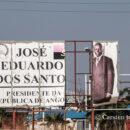In Zimbabwe, A Luta Continua – By David B. Moore

Robert Mugabe’s ZANU-PF has outwitted its main opposition, Morgan Tsvangirai’s Movement for Democratic Change, once again. The Zimbabwe African National Union–Patriotic Front’s 61% to 33% victory in Zimbabwe’s July 31 presidential race and its 2/3 majority in parliament guarantee it a firm hold for the next five years (barring yet to be seen constitutional changes), although its own internal tensions may see it fall from heights that even it did not expect.
The ZANU-PF applied, Machiavelli-style, a classic Gramscian combination of forceful power and sly persuasion – the dialectic of coercion and consent – to confound the fourteen-year-old MDC challenge, along with most members of the Southern African Development Community (SADC), the African Union, and the western world (including the Andrew Youngs and Jesse Jacksons who filed into Harare’s State House hoping the United States could take a clean and sanctionless ZANU-PF beyond pariah status).
The scale of ZANU-PF’s claims of a “credible” electoral win are tarnished by reports of chicanery and what the MDC likes to call “shenanigans”, as it declares the results null and void, but it is doubtful that records of all the “revolutionary party’s” electoral misdemeanours will change the harsh world of realpolitik that will allow ZANU-PF’s careful plan to proceed.
The MDC’s hopes for a crossover reached their peak in what is said to be Zimbabwe’s largest ever political rally, in Harare behind the Rainbow Towers Hotel, two days before the hastily packaged election process reached its end. Zimbabwe’s 89-year-old president may attain his 2005 promise to rule until he is 100 years old. The crossover was in stark contrast to the hopes of the MDC, its civil society supporters, and democrats the world over, but it does mark a fundamental transformation in the Zimbabwean polity and social order. All Zimbabwe’s political actors will face at least five years of deep change as their country marks the end of its ruler’s 33 year reign, with no anointed successor in sight.
Zimbabwe’s Central Intelligence Organization (reportedly with a diamond mine of its own to help) masterminded a campaign that blended carrots (for those who would respond negatively to coercion) with sticks (wielded directly or indirectly in the form of timely reminders by “˜retired’ and otherwise members of the security apparatus) for those for whom carrots were not enough.
Those in Matabeleland who do not easily forget the Gukurahundi in the eighties that may have killed 20,000 were showered with teapots and other diamond funded trappings. Some urbanites were happy to have their rates arrears annulled shortly before the election (not thinking how this would worsen their already shambolic municipal service delivery, and forgetting how central state stymied any efforts by MDC councillors to get the cities running again), while others in the cities were hassled into a state of fear approaching the mid-2008 presidential “˜runoff’, when the violence was so severe Morgan Tsvangirai pulled out, by the ZANU-PF instigated chipangano milita gangs.
Meanwhile rural chiefs were told to line up support for ZANU-PF in time honoured fashion: the consequences of a repeat of the March 2008 vote, when even the inventive vote counters could not manufacture a majority for Mugabe, were made more than clear. New farmers struggling to make ends meet on the farms carved out of former commercial units were showered with inputs, directly in Mugabe’s name. Media manipulation – a small example being the headlined flagging of an invented Freedom House public opinion piece saying that ZANU-PF would win with 69.5% of the vote, but which had been “gagged by the American embassy” – was also part of the mix.
Combined with the MDC’s flat-footedness and a hubris partially generated by over four years of being so-close-but-so-far to power in the heavily skewed transitional inclusive government (TIG, often called the Government of National Unity) corralled by SADC’s facilitator Thabo Mbeki after the mid-2008 massacres, ZANU-PF’s clever and long-planned strategy won the day. The result, however, will lead to flip-flopping between ultra-nationalist policies, from the hats of some of ZANU-PF’s young turks, and efforts at technocracy by some of its older guard, who would like their leader to fade away with a reputation renewed from the last few years of disrepair. The reconciliator of 1980, the Mugabe who romped into power with a post-liberation war election that history may show to be as marred as this one, will try to be reborn. Along with policy fluidity will come mixes of retribution and co-optation amidst internal restructuring in both parties.
Today, as since 2000 when the MDC entered the electoral fray while the “land invasions” got underway, the opposition has been defeated. It has rejected the results as fraudulent, and as the numbers proving its point are being crunched its leaders debate the merits of pulling out of the seats they have won. The results, carefully pre-contrived by the ruling party and Nikuv, its electoral mercenaries from Israel (to be sure a sight better than mercenaries of Executive Outcome hues in the past) with a myriad of tricks including a fantastical voters roll, and slanted in polling stations with such tricks as thousands of “assisted voters” (instantly “illiterate” voters being helped along by police officers, who in any case were overly-represented in the stations), will inevitably be proven fraudulent enough, but they will take months if not years to verify.
In any case, the Constitutional Court that will be the forum of disputation is stacked with ZANU-PF stalwarts. The international complainants will lose stomach, hoping to engage with the victors of an election already declared “credible” (note how international standards have changed where democracy is dangerous) by SADC and the AU to encourage stability and maybe even the pursuit of neo-liberal economic policies. The MDC will have to stomach the bitter pill and become a purely oppositional party once again.
While MDC leaders debate a boycott of parliament and local governments, the party will have to consider the demands of its members who need a salary, not to mention the needs of their constituents. To leave them to the whims of the exultant victors would likely be counter-productive. The MDC will have to rebuild along the lines of opposition parties everywhere. It will be faced with two serious issues in the next weeks, months and years:
First, Morgan Tsvangirai’s leadership will be questioned. He has fobbed five elections since 2000. Noble history aside, he is severely hobbled. Perhaps excessive reliance on the likes of the International Republican Institute has contributed to the fall of the one-time trade union-based party. This ties in with the second issue: the party must rebuild its mass base. As this process unfolds, the Cold War between Secretary-General Tendai Biti and much younger national organizer Nelson Chamisa – no real challenge to Biti – must be resolved without tearing the party apart. The party has failed to organize well enough to counter the cunning ZANU-PF centaur: 50 years of war and operating in the milieux of local and international maneuvering has created a party very hard to beat; the MDC must learn to beat it and faction fights will not help.
Charismatic preaching does not match dedicated intelligence and hard electoral work that matches Obama’s in calculated sophistication. Biti, no longer hamstrung by the poisoned chalice of the ministry of finance, and a TIG bereft of diamond revenues that could hardly barely get its hands on enough funds to run the election, can now focus on where the MDC left off in 2008. As for the mass base, with trade unions decimated in 15 years of de-industrialization and a core of youthful civil society intellectuals disenchanted with the MDC’s collapse into modes of politics reminiscent of African patron-client relations and its inability to make the TIG work, one foresees a hard road ahead. Add ZANU-PF’s habit of harsh recrimination to those seen to have stymied its right to eternal power, and the path becomes strewn with even more obstacles. New parties led by seasoned civil society actors may flower. How can the MDC rejoin these former colleagues?
Yet ZANU-PF too has a history of imploding during times of crisis, and this victory could be a crisis in disguise. Authoritarian populist policy and practice could ruin Zimbabwean society once more. There are no assurances that diamond and platinum revenue will be ploughed into the state and redistributed, but even then extractive economies are not enough. With the cancellation of payment of overdue rates – perhaps followed by that for electricity in an economy long used to to regular power outages – how will the municipalities rebuild their failing service infrastructure, let alone pay their workers? Countrywide, civil servants are wondering if they will be paid. Will the international financial institutions re-engage to get their $11 billion back? Zimbabwe’s current economic discourse wobbles from instant indigenization (49%/51% deals on offer to multinationals have capital fleeing and the stock exchange tumbling) and weak technocratic offerings: pre-election promises to return from the American dollar imposed to stop free-fall in early 2000 to a local currency are said to have been reversed, but no one can tell if this side of the policy debate will win. The “patriots” will not be derailed any time soon.
Combined with the more visible competition in the longstanding “Mnangagwa vs Mujuru” competition for succession, the “group of 40″ or “super-Zezuru” faction – and these categories are very fluid, kept under control only by the now-flagging abilities of Mugabe to keep them guessing – a self-destructing ZANU-PF could well be in the cards. The “patriots” could be emboldened by diamonds – but the other factions have access to more of them. Such battles mean that it is unlikely that many of the gems will get to the state institutions needing them.
If the economy nosedives again, the choices facing Zimbabweans at large will be stark. They have become very adept at making the informal sector work – and bringing in millions from relatives in the diaspora – but this is a precarious political economy at the best of times. Zimbabweans may well have to chance the resistance option once again. Will the MDC be able to marshal a collective desire for contestation to its side before it gets out of hand, or will a ZANU-PF style of populism win the day?
As always in Zimbabwean politics, the phrase born out of its neighbours struggles – “a luta continua” – is apposite, especially as it jars with its turn in the English variation to “the looting continues”.
David B. Moore is a Professor at the University of Johannesburg.
This article was first published by OpenCanada.org, the international affairs hub of the Canadian International Council, and is reposted here with permission.






I would be very curious to know more about this comment on Tsvangirai: “excessive reliance on the likes of the International Republican Institute”.
What is this a reference to?
[…] via In Zimbabwe, A Luta Continua — by David B. Moore | African Arguments […]
[…] Zimbabwe, A Luta Continua by ZimSitRep – 08-13-2013 via In Zimbabwe, A Luta Continua — by David B. Moore | African Arguments Robert Mugabe’s ZANU-PF has outwitted its main opposition, Morgan Tsvangirai’s Movement for […]